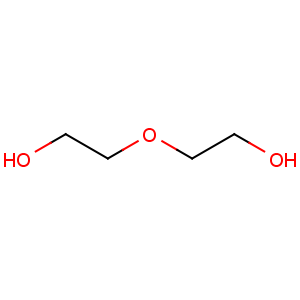Title: Diethylene Glycol
CAS Registry Number: 111-46-6
CAS Name: 2,2¢-Oxybisethanol
Synonyms: 2,2¢-oxydiethanol
Molecular Formula: C4H10O3
Molecular Weight: 106.12
Percent Composition: C 45.27%, H 9.50%, O 45.23%
Literature References: Manuf from ethylene oxide and glycol:
Faith, Keyes & Clark's Industrial Chemicals, F. A. Lowenheim, M. K. Moran, Eds. (Wiley-Interscience, New York, 4th ed., 1975) pp 397-402. Toxicity study: H. F. Smyth
et al., J. Ind. Hyg. Toxicol. 23, 259 (1941).
Properties: Colorless, hygroscopic, practically odorless liq; sharply sweetish taste. d2020 1.118. Solidifies at -10.45° (when pure). mp -6.5°. bp 244-245°.
nD20 1.4475. Flash pt, open cup: 290°F (143°C). Misc with water, alc, ether, acetone, ethylene glycol. Practically insol in benzene, carbon tetrachloride. LD50 in rats, guinea pigs (g/kg): 20.76, 13.21 orally (Smyth).
Melting point: mp -6.5°
Boiling point: bp 244-245°
Flash point: Flash pt, open cup: 290°F (143°C)
Index of refraction: nD20 1.4475
Density: d2020 1.118
Toxicity data: LD50 in rats, guinea pigs (g/kg): 20.76, 13.21 orally (Smyth)
CAUTION: Symptoms on ingestion similar to ethylene glycol,
q.v. Fatal poisoning resulted from its use as a solvent in an elixir.
See E. Browning,
Toxicity and Metabolism of Industrial Solvents (Elsevier, New York, 1965) pp 624-628, 686-690;
Patty's Industrial Hygiene and Toxicology vol. 2C, G. D. Clayton, F. E. Clayton, Eds. (Wiley-Interscience, New York, 3rd ed., 1982) pp 3832-3838.
Use: In antifreeze soln for sprinkler systems, water seals for gas tanks, etc. (water with 40% diethylene glycol freezes at -18°; with 50% at -28°); as lubricating and finishing agent for wool, worsted, cotton, rayon, and silk; as solvent for vat dyes; in composition corks, glues, gelatin, casein, and pastes to prevent drying out.

